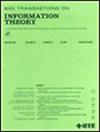Quantum Ruzsa Divergence to Quantify Magic
IF 2.2
3区 计算机科学
Q3 COMPUTER SCIENCE, INFORMATION SYSTEMS
引用次数: 0
Abstract
In this work, we investigate the behavior of quantum entropy under quantum convolution and its application in quantifying magic. We first establish an entropic, quantum central limit theorem (q-CLT), where the rate of convergence is bounded by the magic gap. We also introduce a new quantum divergence based on quantum convolution, called the quantum Ruzsa divergence, to study the stabilizer structure of quantum states. We conjecture a “convolutional strong subadditivity” inequality, which leads to the triangle inequality for the quantum Ruzsa divergence. In addition, we propose two new magic measures, the quantum Ruzsa divergence of magic and quantum-doubling constant, to quantify the amount of magic in quantum states. Finally, by using the quantum convolution, we extend the classical, inverse sumset theory to the quantum case. These results shed new insight into the study of the stabilizer and magic states in quantum information theory.量化魔法的量子鲁萨散度
在这项工作中,我们研究了量子卷积下的量子熵行为及其在量化魔力中的应用。我们首先建立了一个熵量子中心极限定理(q-CLT),其中收敛速率受魔隙约束。我们还在量子卷积的基础上引入了一种新的量子发散,称为量子鲁兹萨发散,用于研究量子态的稳定器结构。我们猜想了一个 "卷积强次累加性 "不等式,它导致了量子鲁兹萨发散的三角不等式。此外,我们还提出了量子鲁兹萨魔力发散和量子加倍常数这两个新的魔力度量,以量化量子态中的魔力量。最后,通过量子卷积,我们将经典的逆和集理论扩展到了量子情况。这些结果为研究量子信息论中的稳定器和魔态提供了新的视角。
本文章由计算机程序翻译,如有差异,请以英文原文为准。
求助全文
约1分钟内获得全文
求助全文
来源期刊

IEEE Transactions on Information Theory
工程技术-工程:电子与电气
CiteScore
5.70
自引率
20.00%
发文量
514
审稿时长
12 months
期刊介绍:
The IEEE Transactions on Information Theory is a journal that publishes theoretical and experimental papers concerned with the transmission, processing, and utilization of information. The boundaries of acceptable subject matter are intentionally not sharply delimited. Rather, it is hoped that as the focus of research activity changes, a flexible policy will permit this Transactions to follow suit. Current appropriate topics are best reflected by recent Tables of Contents; they are summarized in the titles of editorial areas that appear on the inside front cover.
 求助内容:
求助内容: 应助结果提醒方式:
应助结果提醒方式:


